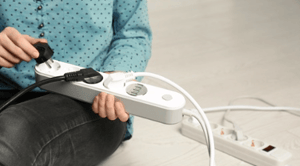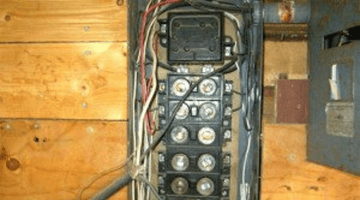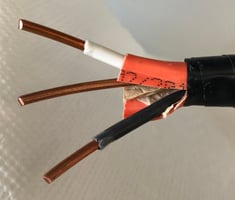If your home is older – built before 1990 – or has not had an electrical upgrade since then, you...
Do Your Extension Cords Stretch the Boundaries of Safety?
 When you can't reach the nearest outlet, extension cords can be a blessing. Misused, however, they can also be a safety hazard. Using extension cords as intended is the single best way to reduce your risk of fire or electrical shock. Most people don't know the ins and outs of safe use, though. Before reaching for the nearest cord in a junk drawer, it's best to familiarize yourself with some basic safety rules.
When you can't reach the nearest outlet, extension cords can be a blessing. Misused, however, they can also be a safety hazard. Using extension cords as intended is the single best way to reduce your risk of fire or electrical shock. Most people don't know the ins and outs of safe use, though. Before reaching for the nearest cord in a junk drawer, it's best to familiarize yourself with some basic safety rules.
What Everyone Should Know About Extension Cords
How many extension cords are in use in your home right now? While they can be incredibly useful as a short-term solution, extension cords are intended for temporary use. If you're relying upon a cord as a semi-permanent feature for your home’s electrical system, it’s wise to rethink your approach in the interest of safety.
To stay safe while using extension cords temporarily, however, you can follow a few tips.
- Choose only extension cords tested and approved by an independent laboratory.
- Remember that over time, even the highest quality cord will deteriorate. This deterioration increases the risk of fire or electrical shock.
- Don’t use an extension cord for more than one appliance.
- Don’t run cords through ceilings, floors, walls, or doorways. Covering wires prevents heat from escaping, which can increase the risk of fire.
- Never cut off the ground pin to force a three-prong plug into a two-prong outlet. It can result in an electrical shock, and it wholly defeats the purpose of a three-prong plug.
- Don’t chain multiple-plug cords together. Each cord should be plugged directly into a mounted electrical receptacle.
- Never allow an extension cord to run through snow or standing water.
- Are there many cords in use in your home? Reliance on multiple extension cords is a strong indicator you have too few outlets.
- If a cord feels hot or you see any damage, it must not be used. Even a single exposed strand can cause a burn or electrical shock if it's touched.
- Make sure all cords are rated for the products plugged into them, and for outdoor or indoor use, as appropriate.
- Ensure the wattage rating on the appliance or tool is appropriately matched to the wattage rating on an extension cord.
- Never nail or staple an extension cord.
- Extension cords or power strips should not be used to power heaters or fans, which can pose a fire risk if the cords overheat.
- Never coil or bend an extension cord that’s in use.
How you store your extension cords is equally essential. When they're not in use (which ideally is most of the time), they should always be unplugged and stored indoors.
Improving the Safe Use of Extension Cords
One of the most commonly used household electrical tools, extension cords are also among the most inadvertently abused. No one means to use them unsafely. An increase in devices in most homes means an increased reliance on extension cords, which often leads to unsafe behavior.
Wilcox Electric has been providing electrical services, including new outlet installation, to customers in the DC metro area for more than twenty years. Reach out to us today if you need advice or a quote on getting new outlets installed in your home.



